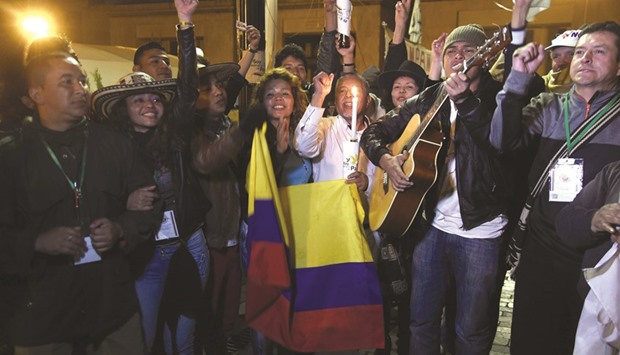Colombia’s government and Marxist Farc rebels have announced a revised peace deal to end 52 years of armed conflict, after voters rejected a prior peace accord in a referendum.
“We have reached a new final agreement to end the armed conflict, which incorporates changes, clarifications and some new contributions from various social groups, which we have gone through one by one,” said a joint statement read out by diplomats from Cuba and Norway, the peace process guarantors.
“Building a stable, lasting peace must be the shared commitment of all Colombians, and one that helps polarisation be overcome while including all social and political voices,” the statement added.
Colombia’s President Juan Manuel Santos stressed that the new peace deal “is a better agreement.”
“We made adjustments, tweaks and changes in 56 of the 57 issues that were addressed,” Santos said, so “we can build a deeper and broader peace.”
The modified agreement leaves intact the accord’s major tenets, including The Revolutionary Armed Forces of Colombia (Farc) laying down its arms and becoming a political party.
However, it includes a number of “innovations” to several of the key points in the original peace deal, according to the government’s lead negotiator Humberto de la Calle.
In Bolivar Square at the heart of historic Bogota, dozens of people celebrated the news with white balloons and Colombian flags.
The new accord was fine-tuned after the groups that opposed the original deal submitted proposed changes as starting points for negotiations.
“The tweaks and clarifications we have made do not undermine the issues we agreed on, which shaped the first peace deal,” De la Calle said.
Santos acknowledged that a suggestion seeking to bar rebel leaders involved in serious crimes from elections was not part of the re-worked peace deal.
He also hinted that the new accord would maintain the provision that Farc rebels could avoid prison time by confessing and carrying out acts of reparation to victims.
But he added that there would be specifications concerning the “effective restriction of their freedom.”
The agreement also states that foreign magistrates will not be allowed on special tribunals to hear cases about those involved in the conflict.
An upbeat chief rebel negotiator Ivan Marquez said “the only thing the new accord needs now is to be put into effect.”
At the moment, neither side has made any mention of the new peace deal being put before a new referendum vote.
The US hailed the agreement, and pledged continuing US support in implementing a peace under which the guerrillas would demobilise and become a political party.
US secretary of state John Kerry said in a statement that the new accord “constitutes an important step forward on Colombia’s path to a just and durable peace.”
The Farc and Santos’ government had been meeting since October 22 to try to rescue a peace deal that has taken four years to negotiate.

People celebrate on Bogota’s main square after the Colombian government and Farc signed a new and revised peace deal to end 52 years of civil war.
